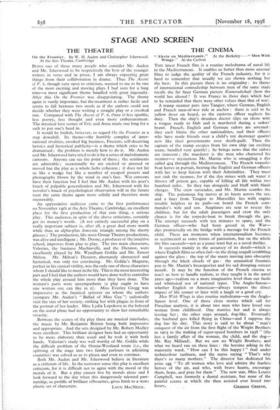STAGE AND SCREEN
THE THEATRE
BEING one of those many people who consider Mr. Auden and Mr. Isherwood to be respectively the best of the younger writers in verse and in prose, I am always expecting great things from their collaboration in drama. Thus The Ascent of F. 6, though very open to criticism, seemed to me to be one of the most exciting and moving plays I had seen for a long time—a most significant theme handled with great ingenuity. After this On the Frontier, was disappointing. The theme again is vastly important, but the treatment is rather facile and seems to fall between two stools as if the authors could not decide whether they were writing a straight play or a crooked one. Compared with The Ascent of F. 6, there i8' less sparkle, less poetry, less thought and even more embarrassment. The mystical love scenes of Eric and Anna made one long for a sack to put one's head in.
It would be foolish, however, to regard On the Frontier as a step downhill. Its theme—the horrible complex of inter- national rivalries, crooked big business, Fascism, self-deceiving heroics and hysterical publicity—is a theme which cries to be dramatised ; the problem is merely how to do it. Mr. Auden and Mr. Isherwood have tried to do it by a series of melodramatic cartoons. Anyone can see the point of these ; the sentiments are admirable ; occasionally we are excited or amused or moved but the play as .a whole lacks cohesion ; it does not hit us like a wedge but like a • number of escaped posters and photographs blown by the wind in one's face. War cartoons have their function but I feel that Mr. Auden with his poet's knack of palpable generalisation and Mr. Isherwood with his novelist's knack of psychological observation will in the future treat the same theme again more solidly and therefore more memorably.
An appreciative- audience came to the first performance on November 14th at the Arts Theatre, Cambridge, an excellent place for the first production of that rare thing, a serious play. This audience, in spite of the above criticisms, certainly got its money's worth. (A not entirely successful play on a really important subject is, after all, a great deal more worth while than an alpha-plus domestic triangle among the sherry glasses.) The production, like most Group Theatre productions, was alive and intelligent ; Mr. Doone, a producer of the intuitive school, improves from play to play. The two main characters, Valerian, the business Machiavelli, and the Dictator, were excellently played by Mr. Wyndham Goldie and Mr. Ernest Milton. Mr. Milton's Dictator, alternately abstracted and hysterical, was only too convincing. Mr. Goldie's Magnate, perfect in his cynical virility, was the only one of those characters whom I should like to meet in the life. This is the most interesting part and I feel that the authors would have done well to centralise the whole play around him more than they have done. The women's parts were unsympathetic (a play ought to have one woman one can like in it). Miss Everley Gregg was impressive as the fanatical spinster on whom the authors (compare Mr. Auden's " Ballad of Miss Gee ") sadistically visit the sins of her society, striking her with plague in front of the portrait of her leader. Miss Lydia Lopokova as the beloved on the astral plane had no opportunity to show her remarkable vivacity.
Between the scenes of the play there are musical interludes, the music by Mr. Benjamin Britten being both impressive and appropriate. And the sets designed by Mr. Robert Medley were excellent. This brilliant designer here had an opportunity to be more elaborate than usual and he took it with both hands. Valerian's study was well worthy of Mr. Goldie while the difficult problem of the Ostnia-Westland room (i.e., the splitting of the stage into two family parlours in adjoining countries) was solved so as to please and even to convince.
Both Mr. Auden and Mr. Isherwood believe in literature as a criticism of life. In the narrower sense this play is excellent criticism, for it is difficult not to agree with the moral or the morals of it. But a play cannot live by morals alone and I look forward to the day when this dangerously talented part- nership, so prolific of brilliant silhouettes, gives birth to a more
























































 Previous page
Previous page